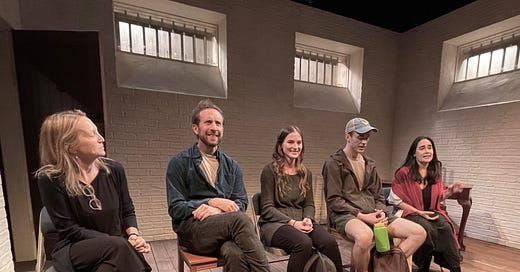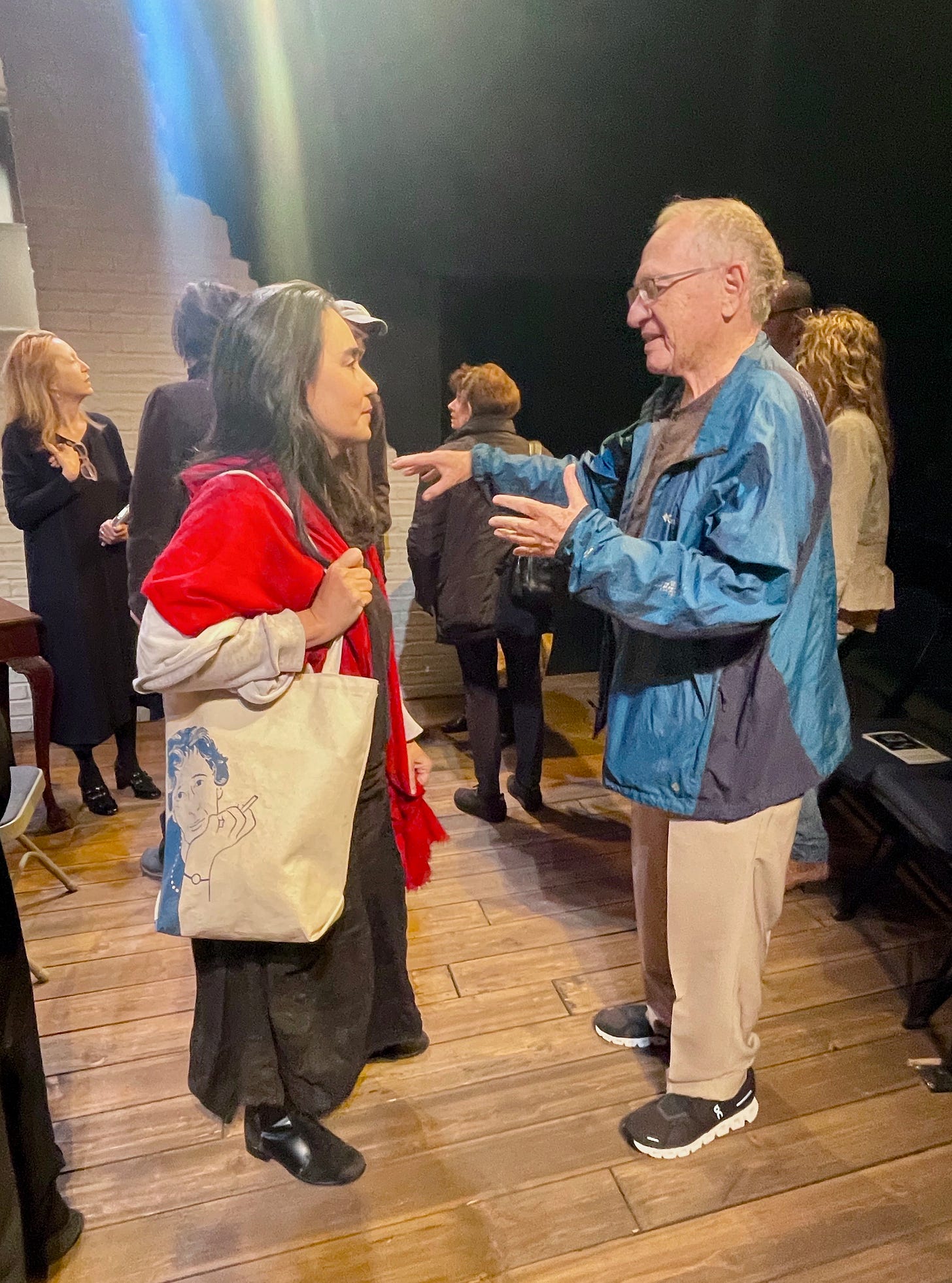The cast and crew of Mrs. Stern Wanders the Prussian State Library get a surprise at talkback (photo by twi-ny/mdr)
I love talkbacks and audience Q&As. You don’t have to ask me twice to stay after a play, dance performance, or film screening and hang out and listen to actors, writers, directors, choreographers, dancers, et al. share behind-the-scenes information about what I’ve just experienced. I often ask questions; over the years, I’ve gotten memorable responses from Patrick Page, Chuck Palahniuk, Lars von Trier, and many others.
Several of my theater colleagues strongly disagree; they wouldn’t be caught dead at a talkback, regardless of the show or who will be participating. “My issue with talkbacks is that too many people just want to express opinions, informed or otherwise, rather than learn anything,” longtime Tony voter Brian Lipton, who writes for Cititour and TheaterMania, told me. “I recall one talkback where a woman insisted two characters were brothers. They were not, as the playwright specifically told her. She loudly declared, ‘Well, I think they are.’”
When I was in college, Robert Altman presented a screening of his underrated 1982 drama, Come Back to the 5 & Dime, Jimmy Dean, Jimmy Dean, and took questions afterward. One film student wanted to know why so much attention was paid to Orange Crush, the drink of choice at the local Woolworth’s counter, surmising that there must be some complex reason for its prevalence. Altman answered, “I chose it because I like Orange Crush,” then went on to chastise the student, lamenting that he worried about the future of film appreciation because of people like him. It took a while for the next person to go up to the mic and ask another question.
(Oddly, I just Googled the title of the film and “Orange Crush” and got an AI Overview that explained, “‘Come Back to the Five and Dime, Jimmy Dean, Jimmy Dean’ refers to a movie title, based on a play, about a group of women who were once devoted fans of James Dean, gathering together years after his death at a small-town drugstore, reminiscing about their teenage obsession, and the ‘Orange Crush’ likely represents a nostalgic drink they would have shared during their youth, possibly connected to their idolization of James Dean.”)
But by skipping talkbacks, my colleagues miss out on the kind of bizarre thing that happened at the October 20 matinee of Jenny Lyn Bader’s superb play Mrs. Stern Wanders the Prussian State Library, which continues through November 10 at 59E59.
The play explores a little-known episode from the life of German Jewish philosopher and author Hannah Arendt. In 1933 Berlin, when she was twenty-six, Arendt was arrested by the Gestapo and imprisoned because of her alleged association with left-wing journalists. In the play, she speaks eloquently as she is interrogated by a guard and visited by a lawyer.
After the show, Bader moderated an impromptu talkback with the three actors and director. She opened the session by saying that Arendt was “arguably the most influential thinker of the twentieth century.”
She asked for questions, and as hands went up, one older gentleman just started in, arguing against Arendt’s legacy. Explaining that he knew Arendt and had debated her in the 1960s, he attacked her 1963 book, Eichmann in Jerusalem: A Report on the Banality of Evil, and challenged her research and the veracity of her tome.
He said he disagreed with Bader that Arendt was “the most important thinker of the twentieth century.”
“I didn’t say she was the most important; I said she was arguably the most influential,” Bader countered, but that didn’t stop the man from going on . . . and on, even though Arendt’s coverage of the 1961 trial of Adolf Eichmann is not mentioned in Mrs. Stern Wanders the Prussian State Library, which is set three decades earlier.
“It had nothing to do with my play,” Bader told me in an interview the next day.
Near the end of the man’s diatribe, I began to recognize him. I Googled his name and found numerous confirming photos; I clicked on one and enlarged it.
When the talk was over — other attendees were eventually able to share their more-relevant thoughts — I approached the three actors as the older gentleman spoke with Bader. I showed them the photo on my phone and excitedly said, “Look who Jenny Lyn is talking to!”
The woman portraying Arendt smiled and said, “That’s my dad!”
Oy vey.
I then remembered that the actress’s name is Ella Dershowitz; her father is polarizing lawyer, professor, and author Alan Dershowitz.
Hannah Arendt, who apparently continues to influence both Bader and Dershowitz — even though one claims she is not influential — is depicted on Bader’s tote bag (photo by twi-ny/mdr)
Once upon a time, I looked forward to reading or hearing what Alan Dershowitz had to say about American civil rights and the State of Israel; in my opinion, he was on the right side of most sociopolitical issues. But that all changed in a disturbing way: About ten years ago, I suddenly found myself angered by his writings and television appearances; his seemingly newfound views on criminal justice, the Constitution, antisemitism, and a certain president confused me. As the headline of a May 2018 article in Politico asked, “‘What Happened to Alan Dershowitz?’ How a liberal Harvard professor became Trump’s most distinguished defender on TV, freaked out his friends, and got the legal world up in arms.”
As readers of Mass Transit know, I almost always say hello to celebrities of all stripes and try to engage them in brief, non-fan-geek conversations. But I chose not to greet Mr. Dershowitz, in part because I did not appreciate how he had hijacked the talkback, which included actors Ella Dershowitz, Brett Temple, and Drew Hirshfield and director Ari Laura Kreith in addition to Bader.
“I was not expecting Professor Dershowitz to change the main topic we were talking about,” Bader — who is married to author and educator Roger Berkowitz, founding academic director of the Hannah Arendt Center for Politics and Humanities at Bard College — later told me. “So I think that a conversation with him about these issues might be fruitful at some point, but we had twenty minutes to talk about the play and answer the whole audience’s questions. I could have given more examples of how Arendt is influential, how Roger’s podcast, ‘Reading Hannah Arendt,’ had fifty thousand downloads four months in. Or how widely her work is still read. How many philosophers have bestselling books decades after they’ve been written and continue to animate discussion? But the very fact that he felt that he needed to argue with her, even in her absence, shows she continues to be influential. His very statement belied what he was saying.”
Watching this unfold was a surreal experience. Alan Dershowitz, who is eighty-six, was debating a playwright who was staging a drama about a famous philosopher who he had debated more than half a century earlier, a renowned theorist who was now being elegantly portrayed by his daughter.
I contacted Ella and asked her what it was like to have just finished playing Arendt and then watch your father criticize her character’s prestige. She wisely chose not to comment, but I did notice her roll her eyes at the talkback.
The discussion was not recorded, but Professor Dershowitz’s points were similar to ones he has made in several articles, including a 2015 op-ed published by the Jerusalem Post and the Washington Examiner in which he claimed, “Arendt was assigned to report on the 1961 trial of Eichmann in Jerusalem but, according to contemporaries, she rarely attended the trial. She came to Jerusalem having made up her mind in advance that Eichmann in particular and other perpetrators of the evils of the Holocaust were ordinary, banal functionaries. She reported on the trial with an agenda. It was not necessary for her to actually observe and listen to Eichmann because to do so would undercut her thesis. So instead, she wrote a mendacious screed in which she constructed a stick-figure caricature of one of the most significant perpetrators of the Holocaust.”
Ella Dershowitz stars as Hannah Arendt in Mrs. Stern Wanders the Prussian State Library (photo by Valerie Terranova)
In our interview, Bader explained, “Professor Dershowitz said some things that were not true. I mean, he said that Hannah Arendt claimed to have attended the whole trial. She doesn’t say in the book that she attended the whole trial. And she certainly read the entire trial transcript, and that is largely what the book is about. There are also some journalistic descriptions of what happened at the trial. This is very complicated and interesting, the subject of Eichmann in Jerusalem and the phrase ‘banality of evil.’ I wanted to give other people in the audience a chance to ask questions; I didn’t want to get sidelined. But when that other woman later asked a question about the banality of evil, I took that as an opportunity to address some of the questions he had raised in case they continued to be lingering for others.”
“You handled it very well,” I said.
“Thank you,” she answered. “He felt that even though he had just seen the play — and he was, as you may recall, complimentary about it; he said he really enjoyed it — he wanted it to be known that he knew Hannah Arendt, that he had debated her on the subject of free speech. I would be interested in knowing more about the debate.”
So would I, but my online searches came up empty.
In the meantime, I highly recommend the show; Bader will participate in Q&As following the 2:15 performances on November 6, 7, and 8.
Please remember to stay on topic.
[You can follow Mark Rifkin and This Week in New York every day here.]






Wow, what a scene! You could write a play, or movie for that matter, about what you just described!
Mark,
Aside from is rightwing slide and his rudeness during the play, Dershowitz' association with Jeffrey Epstein and his 1997 op-ed in the Los Angeles Times, where he argued against statutory-rape laws, is disturbing enough for me to never take anything this pig says seriously ever again.
Glenn